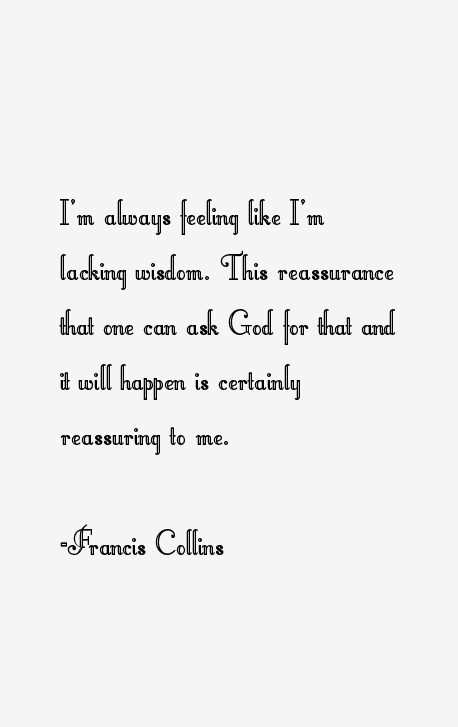Francis Collins Quotes & Sayings
56 most famous Francis Collins quotes and sayings (scientist). These are the first 10 quotes we have.
“I became an atheist because, as a graduate student studying quantum physics, life seemed to be reducible to second-order differential equations. Mathematics, chemistry and physics had it all. And I didn't see any need to go beyond that.”
“It's interesting when you read the life of Christ how much of his time he spent healing the sick. There must have been a reason for that - he was modelling for us what it is we are intended to do by following his path.”

“I believe God did intend, in giving us intelligence, to give us the opportunity to investigate and appreciate the wonders of His creation. He is not threatened by our scientific adventures.”

“One must dig deeply into opposing points of view in order to know whether your own position remains defensible. Iron sharpens iron.”
“The brain is the most complicated organ in the universe. We have learned a lot about other human organs. We know how the heart pumps and how the kidney does what it does. To a certain degree, we have read the letters of the human genome. But the brain has 100 billion neurons. Each one of those has about 10,000 connections.”
“As a Christian, but also as a scientist responsible for overseeing the Human Genome Project, one of my concerns has been the limits on applications of our understanding of the genome. Should there be limits? I think there should. I think the public has expressed their concern about ways this information might be misused.”

“I'm always feeling like I'm lacking wisdom. This reassurance that one can ask God for that and it will happen is certainly reassuring to me.”

“Successful weight management really means a permanent change in lifestyle - and success in this arena provides that person with a great opportunity to model that behavior for friends and family.”
“The shelves of many evangelicals are full of books that point out the flaws in evolution, discuss it only as a theory, and almost imply that there's a conspiracy here to avoid the fact that evolution is actually flawed. All of those books, unfortunately, are based upon conclusions that no reasonable biologist would now accept.”
“I'm enormously interested to see where neuroscience can take us in understanding these complexities of the human brain and how it works, but I do think there may be limits in terms of what science can tell us about what does good and evil mean anyway, and what are those concepts about?”
Francis Collins Quotes Rating
No Ratings Yet
Leave A Comment
























